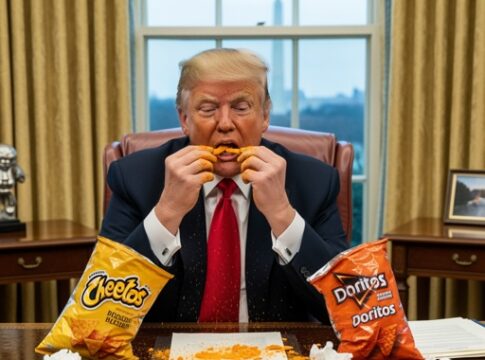America’s iconic orange snack foods are losing their fiery hue—and it’s a direct result of new Trump administration policies shaking up the food industry.
Trump Administration Drives Industry to Ditch Artificial Dyes
In a move that has caught the attention of snack lovers nationwide, PepsiCo—the parent company of Cheetos and Doritos—announced it will launch new versions of its beloved snacks with less vibrant orange coloring, free from artificial dyes and flavors. This decision is not just about shifting consumer preferences; it’s being driven by a wave of regulatory and political pressure, most notably from President Trump’s administration, which has demanded an industry-wide phase-out of synthetic food dyes by the close of next year. The administration’s stance reflects a commitment to public health and regulatory reform, marking a departure from previous years of government inaction and a response to decades of frustration over food safety and transparency in labeling.
PepsiCo’s announcement comes amid a broader trend in the U.S. food industry, where manufacturers are being pushed to reformulate products in response to both consumer demand and direct government intervention. While PepsiCo has sold “Simply” brand snacks without artificial dyes for over two decades, these products never quite matched the original flavors. The new “Simply NKD” (Naked) line, launching December 1, 2025, is designed to replicate the iconic taste of Cheetos and Doritos but with cleaner, more natural ingredients. This approach allows PepsiCo to appeal to health-conscious shoppers while still catering to loyal fans who crave the original flavor profile, though the snacks’ iconic orange look will be noticeably muted.
Political and Regulatory Landscape: Why This Is Happening Now
The Trump administration’s aggressive push for the removal of synthetic dyes from food products is part of a broader regulatory agenda that prioritizes the health and safety of American families. Unlike previous administrations that often bowed to corporate interests or failed to enforce meaningful reforms, the current leadership has made it a priority to hold food giants accountable. State governments, such as Texas, have enacted laws requiring warning labels for foods containing artificial ingredients, signaling a shift in the balance of power from corporate boardrooms to the hands of the people and their elected representatives. This new environment represents a victory for those who have long advocated for transparency, common sense, and constitutional principles in public policy.
PepsiCo executives have framed the launch of the Simply NKD line as a “snacking revolution,” emphasizing that the unforgettable flavor of these snacks can exist without the artificial colors that have defined their appearance for generations. According to company leadership, 40% of PepsiCo’s U.S. products still contain synthetic dyes, but ongoing reformulation efforts are expected to accelerate under mounting political and regulatory pressure. Industry analysts note that similar moves by competitors such as Kraft Heinz and General Mills signal a wider shift across the food sector, with government policy now serving as a key driver of change rather than an obstacle to reform. While some consumers remain skeptical about whether the flavor will truly remain unchanged, others see the removal of artificial dyes as a long-overdue step toward protecting public health, especially for children.
Implications for Consumers, Industry, and Conservative Values
The introduction of dye-free Cheetos and Doritos is expected to have immediate and lasting effects. In the short term, PepsiCo may see a boost in sales and enhanced brand reputation among health-conscious consumers, though some loyal customers may question the changes in appearance. Over the long term, this move could set a precedent for further industry-wide reformulation, increased regulatory compliance, and a broader shift toward natural ingredients in processed foods. For conservative Americans who value individual liberty and limited government, the Trump administration’s approach demonstrates that targeted regulatory action—when grounded in constitutional authority and the public interest—can yield results that protect families without expanding government overreach. The fact that original versions of Cheetos and Doritos will remain available ensures that consumer choice is preserved, offering a pragmatic solution that respects both tradition and innovation.
Looking ahead, other major food companies are likely to follow PepsiCo’s lead, further accelerating the move away from artificial dyes across the industry. This development underscores how effective leadership—rooted in American values and responsive to public concerns—can drive positive change while respecting both the free market and the nation’s foundational principles. The Trump administration’s actions in this arena are a refreshing alternative to the “woke” overreach and globalist policies of the past, focusing instead on practical solutions that resonate with everyday Americans. As the reformulated snacks hit shelves, consumers will have the final say, with more choices than ever before and the assurance that their voices and values are shaping the future of the nation’s food supply.
Sources:
Doritos and Cheetos dial back the bright orange in new versions without artificial ingredients
Cheetos and Doritos are turning down the orange color — and yes, it is a Trump thing
Cheetos and Doritos to go dye-free as Trump administration cracks down on artificial colors

